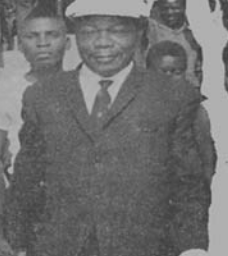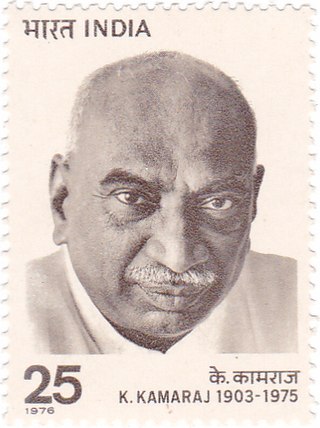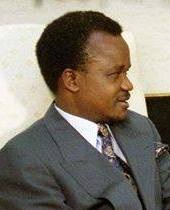 |
|---|
The National Progressive Party was a political party in Zambia led by John Roberts. [1]
 |
|---|
The National Progressive Party was a political party in Zambia led by John Roberts. [1]
The party was established in April 1963 as a Northern Rhodesian successor to the United Federal Party. [2] It won all 10 seats reserved for Europeans in the 1964 general elections. However, with the reserved seats due to be abolished before the 1968 elections, the party dissolved itself in August 1966, [3] with its MPs sitting as independents until the end of the terms. [4]

The United National Independence Party (UNIP) is a political party in Zambia. It governed the country from 1964 to 1991 under the socialist presidency of Kenneth Kaunda, and was the sole legal party in the country between 1973 and 1990. On 4 April 2021, Bishop Trevor Mwamba was elected President of UNIP.

The Manipur Peoples Party (MPP) is a political party in the Indian state of Manipur. MPP was founded on 26 December 1968 by a group of dissidents from the Indian National Congress. At the February 2007 Manipur state elections, the party received 5 of the 60 seats.

Elections in Zambia take place within the framework of a multi-party democracy and a presidential system. The President and National Assembly are simultaneously elected for five-year terms.

The Patriotic Front (PF) is a social democratic political party in Zambia. The party was formed by Michael Sata as a breakaway party of the Movement for Multiparty Democracy (MMD) in 2001 after the President Frederick Chiluba nominated Levy Mwanawasa as its presidential candidate for 2001 elections. The party's main base of support are usually the youth and poor people in urban centres.

The Zambia Republican Party is a political party in Zambia.
The Northern Rhodesia Congress was a political party in Zambia.

Harry Mwaanga Nkumbula was a Zambian nationalist leader involved in the movement for the independence of Northern Rhodesia, as Zambia was known until the end of British rule in 1964. He was born in the village of Maala in the Namwala district of Zambia's southern province. He was the youngest of three children and the only son.

The first legislative assembly Election to the Madras state based on universal adult suffrage was held in 27 March 1952. This was the first election held in Madras state after the Indian Independence. This election was officially known as the 1951 Madras State Election, even though through delays, actual voting didn't take place until early 1952.

The second legislative assembly election to the Madras state was held on 31 March 1957. This was the first election held after the linguistic reorganisation of Madras State in 1956. Indian National Congress and its leader, K. Kamaraj won the election and defeated their rival, Dravida Munnetra Kazhagam. In 1954, due to the resignation of C. Rajagopalachari, for his controversial Kula Kalvi Thittam, the leadership of Congress was contested between K. Kamaraj, and C. Subramaniam. Eventually, K. Kamaraj, won the support of the party, was elected leader and chief minister of Madras State in 1954. In a surprise move, he appointed both M. Bhaktavatsalam and C. Subramaniam, to his cabinet, allowing great unity amongst the Congress that ruled the state of Madras, for the next decade. This election saw future DMK leaders M. Karunanidhi and K. Anbazhagan win their first MLA seats in the legislative assembly.
Zambians for Empowerment and Development is a political party in Zambia.

The first legislative assembly election for the Madras Presidency was held in February 1937, as part of the nationwide provincial elections in British India. The Indian National Congress obtained a majority by winning 159 of 215 seats in the Legislative Assembly. This was the first electoral victory for the Congress in the presidency since elections were first conducted for Madras Legislative Council in 1920. The Justice Party which had ruled the presidency for most of the previous 17 years was voted out of power. The assembly was constituted in July 1937 and C. Rajagopalachari (Rajaji) became the first Congress Prime Minister of Madras.

General elections were held in Northern Rhodesia on 20 and 21 January 1964. There were two voter rolls for the Legislative Council, a main roll that elected 65 seats, and a reserved roll that elected 10. Africans elected the main roll, whilst Europeans elected the reserve roll. Other ethnicities were allowed to choose which roll to be part of. The United National Independence Party won the elections, taking 55 of the common roll seats. Its leader, Kenneth Kaunda became Prime Minister, leading the country to independence in October that year, at which point he became President. Voter turnout was 94.8% for the main roll and 74.1% for the reserved roll.

General elections were held in Zambia on 19 December 1968 to elect the National Assembly and President. The first post-independence polls saw incumbent Kenneth Kaunda retain his post as president, whilst his United National Independence Party, the only party to field candidates in all 105 constituencies, won 81 of the 105 seats in the National Assembly. Voter turnout was 82.5% in the parliamentary election, but 87.1% in the presidential election.

General elections were held in Zambia on 31 October 1991 to elect a President and National Assembly. They were the first multi-party elections since 1968, and only the second multi-party elections since independence in 1964. The United National Independence Party (UNIP), which had led the country since independence, was comprehensively beaten by the Movement for Multi-Party Democracy (MMD). Kenneth Kaunda, who had been president since independence, was defeated in a landslide by MMD challenger Frederick Chiluba in the presidential elections, whilst the MMD won 125 of the 150 elected seats in the expanded National Assembly. Voter turnout was 45%.

General elections were held in Northern Rhodesia on 20 March 1959, although voting did not take place in two constituencies until 9 April. The United Federal Party (UFP) was expected to win the elections, and did so by taking 13 of the 22 elected seats on the Legislative Council.
Sir Cecil Dennistoun Burney, 3rd Baronet was a British businessman and politician in Zambia (1959-1970), having emigrated in 1951 but returning to Britain in 1970.
Akshay Kumar Das was a Bengali Hindu politician of Pakistan, who served as a representative of East Pakistan in both the First and Second Constituent Assemblies, and held multiple ministries across the 1950s in governments formed by different political parties.
Margret Safatiya Mbeba was a Zambian politician. She served as a member of the National Assembly for Kazimuli from 1964 to 1968 and was jointly one of the first elected female MPs in Zambia.

The Party Of National Unity and Progress is a political party in Zambia. The party was originally launched in Lusaka in May 2017 as the Party of National Unity (PNU), but later relaunched and rebranded as the Party of National Unity and Progress (PNUP) in January 2021.